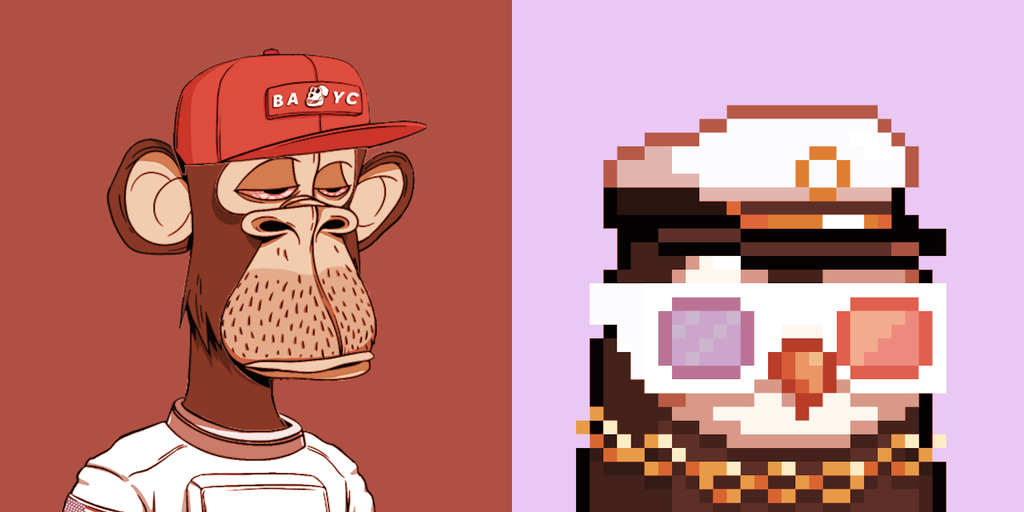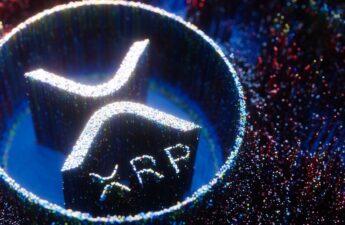In brief
A new Galaxy Digital research report claims that NFT project creators are falling short in how they assign IP rights to holders.
It calls out the Bored Ape Yacht Club and Moonbirds as projects that have potentially “misled” buyers with IP rights claims.
One of the most compelling selling points for some NFT projects is the ability for holders to commercialize their avatars to create and sell derivative artwork, merchandise, and more. But a new report from Galaxy Digital suggests that major NFT projects have “misled” buyers about what they’re getting when it comes to supposed IP rights.
Released on Friday, “A Survey of NFT Licenses: Facts & Fictions” examines the largest NFT projects today based on implied market value, particularly in regards to the rights they claim to bestow to their holders. The report concludes that, in fact, the “vast majority of NFTs convey zero intellectual property ownership” to their owners—and it highlights two projects in particular that Galaxy researchers believe have falsely marketed IP rights to buyers: the Bored Ape Yacht Club and Moonbirds.
Some NFT projects are much more permissive with their IP than others, the report claims. Yuga Labs’ Bored Apes are arguably the best-known example of a project that offers broad license for holders to use their Ethereum NFT images as they see fit. That has led to apparel, marijuana packaging, music projects, and even Ape-themed fast food restaurants.
Other projects place barriers on commercialization, such as Doodles, which the report notes limits the amount of revenue that can be generated by derivative works, plus restricts the ability to modify the original artwork. Meanwhile, Gary Vaynerchuk’s VeeFriends project has a very limited “personal use only” license that doesn’t allow for user-made commercial products.
There are also projects that embrace a fully open-source philosophy, or Creative Commons Zero (CC0) “no rights reserved” approach, letting anyone and everyone use the artwork to create derivative projects—not just NFT holders. Nouns is arguably the best-known example of that, while Moonbirds is about to switch to that kind of license.
However, even when an NFT project offers broad commercialization rights, Galaxy Digital’s report claims that the language can be muddled or contradictory, or outright false. Alex Thorn, head of Galaxy Digital Research, told Decrypt that there’s often “a discrepancy between what the public thinks they’re buying and what they’re really buying” with such NFTs.
An NFT is a blockchain token that represents ownership of an item. Profile picture collections like the Bored Ape Yacht Club and CryptoPunks are popular examples, plus the technology can be used for sports and entertainment collectibles, digital artwork, and video game items.
In the case of the Bored Ape Yacht Club, for example, Yuga Labs’ license says that “when you purchase an NFT, you own the underlying Bored Ape, the Art, completely.” However, Yuga Labs is still the copyright holder that owns the intellectual property, and as such, Galaxy Digital writes that Yuga “implicitly acknowledges that the NFT holder does not, in fact, own the art.”
Earlier this week, Yuga Labs released much longer and more extensive IP licensing agreements for CryptoPunks and Meebits, a pair of popular NFT projects that it acquired earlier this year. Those agreements offer more clarity on NFT holders’ rights, but Yuga Labs’ Noah Davis told Decrypt last week that the Bored Ape license won’t be updated to match those licenses.
Decrypt reached out to Yuga Labs for comment on the Galaxy Digital report and its criticism of its Bored Ape Yacht Club licensing agreement, but did not hear back by the time of publication.
Meanwhile, Moonbirds is chastised in the report for its recently-announced plan to embrace a CC0 license. Tech entrepreneur Kevin Rose’s Web3 startup Proof launched the project earlier this year, and wrote on the Moonbirds website that “You own the IP” when you buy a Moonbirds NFT. Despite that claim, Proof said that it will put Moonbirds into the public domain.
“The fact that Proof can unilaterally change the terms of its license, and did so, is further proof that Moonbirds NFT holders did not, in fact, ‘own the IP,’” the report reads.
Thorn described it to Decrypt as a “more egregious case of discrepancy between marketing materials and the stated licenses” than something like the Bored Ape Yacht Club. Many Moonbirds owners have expressed anger over the decision, with one claiming that a planned “six-figure licensing deal” with a brand fell through after the CC0 announcement.
FYI, shortly after the @moonbirds CC0 announcement, I actually lost a 6 figure licensing deal that I’d been working on for a while.
I understand the decision, but the approach by the team could’ve been much better.
Upwards & Onwards
See you all at Parliament later today!
— Lakoz.eth (🦍 ,🦉) (@Lakoz_) August 5, 2022
Proof did not immediately respond to Decrypt’s request for comment regarding the Galaxy Digital report.
The report further claims that only one project among the top 25 by market capitalization “even attempts” to actually grant IP rights to holders: World of Women. It notes that World of Women has the most thoughtful licensing agreement that attempts to overcome the shortcomings of others on the list—but it too has issues, particularly in regards to how rights transfer after secondary market sales.
“Essentially, no NFT projects are successfully transferring IP rights,” Thorn told Decrypt. “It poses a huge problem for the future of the metaverse and also dramatically undermines that proposed dream of Web3, which is user-owned digital property rights on this future version of the internet,” he said.
Why is that? By and large, Thorn suggested, it’s because the NFT space is still nascent, and such commercialization rights initiatives only gained momentum last year. Some of these licensing agreements appear “amateurish,” he said, and many projects simply take cues from one another. But the licensing terms are getting more detailed as the NFT space matures.
“The Bored Ape Yacht Club is a good example, because as they got bigger and bigger and they built their metaverse out, these agreements have gotten clearer and clearer and more professional,” Thorn told Decrypt.
Galaxy Digital’s report ultimately concludes that NFT owners need to fight for clarity on IP rights, and that it’s up to project creators to find ways to embrace true Web3 ownership, rather than just assigning a license. Otherwise, it suggests, “the NFT landscape will evidently formulate into Web2 products that are marketed and disguised as Web3 products.”
Stay on top of crypto news, get daily updates in your inbox.
Source: https://decrypt.co/107827/bored-apes-moonbirds-misled-buyers-nft-ip-rights-galaxy-digita



